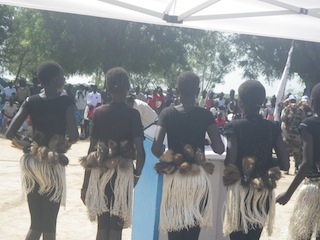Nuer leaders advocate for homegrown peace deal
April 20, 2015 (JUBA) – Senior officials and military officers from Nuer ethnic group in South Sudan government are advocating for people-to-people dialogue in a bid to unite internal front in support of government plans to resolve the country’s ongoing conflict.

The speaker of parliament, Rundial Mangok told Sudan Tribune on Monday that the purpose of the meeting was to take stock of the previous community meetings and to devise ways to support the government in achieving people to people peaceful dialogue.
“The meeting emphasised the process of bridge-building between our people and the government and it was agreed that this process must go beyond dialogue and move towards genuine understanding and encounters, such as visiting each other’s places,” he said.
The top legislator confirmed that the meeting supported creation and appointment of the two vice-presidents with equal status, one of which should be occupied by the incumbent vice president, James Wani Igga and another by a nominee from his ethnic Nuer inside the country if the arrangement allows the former to fill the position.
Gordon Buay, a former rebel spokesperson, now one of the country’s representatives to the United States, said the meeting supported internal dialogue.
“Peace in South Sudan will not come from Addis Ababa but from within. The gathering called for the replication of Wunlit Peace Conference to unite the Nuer and Dinka. The Nuer in the Government must create one leadership that shall be empowered by President Kiir as the only legitimate Nuer leadership,” said Buay, stressing that these were some of the resolutions reached at the meeting.
He said the meeting further resolved that all party positions held by ethnic Nuer who have rebelled shall be occupied by the members of the same ethnic community who are with the government.
“The Nuer called on President Kiir to give the position of a second vice-president to a Nuer inside the Government. The Nuer called on the creation of two vice President positions with equal status. One will be occupied by Wani Igga and the other by a Nuer inside the government,” the resolution reads in part.
The meeting also advocated that the Greater Upper Nile conference be convened so that one position can be derived to deal with the current conflict situation.
Independent analysts interpreted the meeting to mean a political strategy by those in the government to show their continued allegiance in the context of recent defection of a senior military officer. Others, however, see it an attempt to seek assurance of the president to not leave politicians who did not cross to the opposition should the two main warring parties agree to form a government of transitional unity.
It is also viewed as an attempt to preempt the outcome of the opposition leadership meeting underway in Pagak, a rebel-held territory along South Sudan-Ethiopia border.
The convening of the parallel meetings comes at a time when regional mediation backed by the African Union, the US, UK, Norway and the United Nations Security Council (UNSC) is proposing a similar approach to the 2005 Comprehensive Peace Agreement (CPA) between South and North in which parties agreed to sign on the agreed items before moving to the next agenda as a way to resolving differences over contentious issues.
The parties have already agreed on the composition of the transitional government of National Unity of 27 Cabinet ministers but have failed to reach a consensus on power sharing and structural arrangement. The last deal proposed creation of the two vice-presidents to accommodate the opposition and the government.
The government seeks 60% deal on power sharing, 30% to the opposition and 10% to the former political detainees with other political parties in the country.
But unofficial reports indicate that the regional bloc in collaboration with African Union, troika countries and the United Nations seeks to give proportional representation to two main warring parties, allocating 40% to the government, 40% to the opposition and 10% to former political detainees and other political parties.
The new proposal has received mixed reactions from both sides to the conflict, with government rejecting anything below 60%, claiming it would be rewarding rebellion.
(ST)
